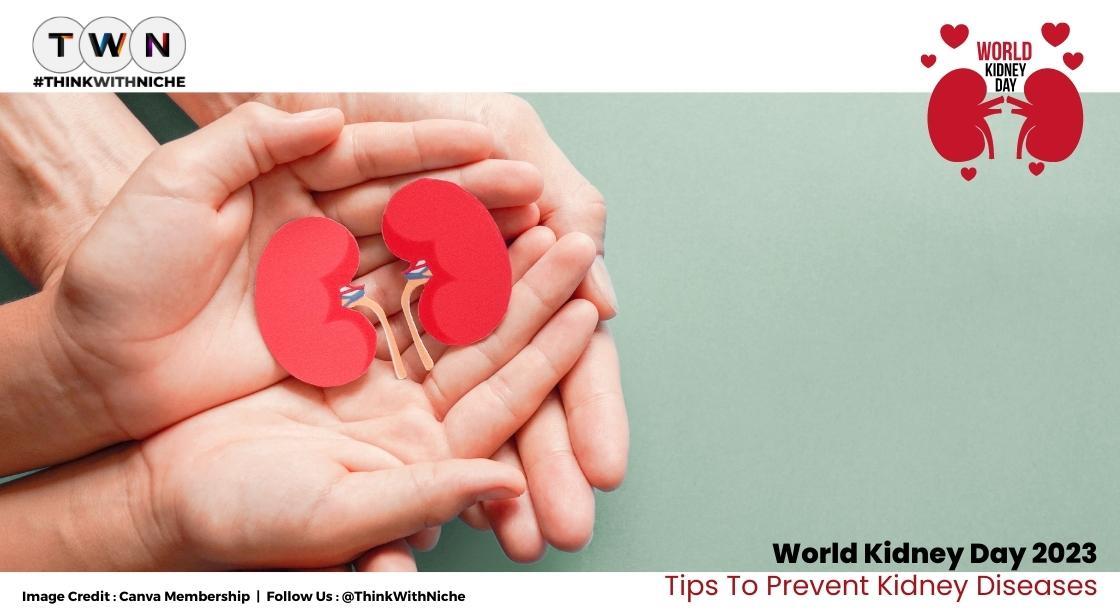World Kidney Day 2023: Tips To Prevent Kidney Diseases

Blog Post
Since 2006, the second Thursday in March has been designated as World Kidney Day. Its goals are to unite renal disease patients and raise public awareness of "amazing kidneys" by informing people of their importance to good health. World Kidney Day is observed on Thursday, March 9, 2023.
Eating a balanced diet with the proper ratio of all the nutrients can work wonders for sustaining kidney health. Avoiding fruits, juices, dry fruits, and foods high in phosphorus is advised if the kidneys aren't working properly.
Kidney patient needs to closely monitor their salt consumption and rigorously avoid packaged foods that can unintentionally increase their salt intake and further harm their kidneys. A few chronic disorders, including diabetes and high blood pressure, can potentially damage the kidneys. Your kidneys can be repaired and kept in good shape if you manage these problems effectively. We will provide you with some important tips to Prevent Kidney Diseases this World Kidney Day.
Many medical efforts are carried out on this day, including systematic screening for all forms of chronic kidney disease (especially patients suffering from diabetes and hypertension). Support for kidney transplantation as the best treatment option in cases of kidney failure.
As chronic kidney disease can occur at any age and is accelerated by a number of risk factors, 1 in 10 persons globally have some degree of the condition
People from South Asian countries, such as India, Pakistan, Bangladesh, and Sri Lanka, are genetically at a higher risk of developing chronic kidney disease, particularly given the rising prevalence of diabetes and hypertension.
World Kidney Day 2023: Tips To Prevent Kidney Diseases
World Kidney Day's (WKD) History
World Kidney Day was established via cooperation between the International Society of Nephrology (ISN) and the International Federation of Kidney Foundations (IFKF). It contributes to spreading awareness of the value of "amazing kidneys" in maintaining overall health and lowering the incidence of kidney disease globally.
The theme of World Kidney Day in 2023
"Kidney Health for All - Preparing for the Unexpected, Supporting the Vulnerable" is the theme of World Kidney Day 2023 this year. It is an appeal to patients, governments, world leaders, and other interested parties who are in positions of power to work cooperatively to raise awareness of the difficulties faced by people with chronic kidney disease.
Additionally, it promotes cooperation between many medical associations working to advance the field of disabling hearing loss through scientific study as well as the coordinated regulation of numerous policies to combat the epidemic of chronic kidney disease.
On March 9, people around the world mark World Kidney Day to raise awareness of this group of illnesses, how they are managed, what treatments are available, and what preventive steps can be taken to help everyone.
Importance of Kidney
The removal of waste materials created by our bodies is done by the kidneys. Unfortunately, the kidneys are unable to work normally in persons with chronic kidney disease, and waste products begin to build up. Many health issues may result from this.
Types of Dialysis
Advanced kidney failure patients require artificial support to eliminate waste materials and excess water. Dialysis is the term for this assistance, and there are two types: hemodialysis and peritoneal dialysis.
Hemodialysis dialysis
Hemodialysis uses artificial filters to remove waste from the bloodstream, whereas peritoneal dialysis uses the lining of the abdominal cavity.
Hemodialysis is a life-saving treatment for persons with chronic kidney disease since it removes waste products, improves the functionality of all the organ systems, and lengthens the patients' lives. Treating symptoms including fluid retention, loss of appetite, nausea, and vomiting, it can also help people live better lives.
Hemodialysis patients can live productive lives because the therapy allows them to carry on with their regular routines. They feel better and have more energy as a result. Dialysis patients can continue to work, travel, and partake in other enjoyable activities, all of which can enhance their general quality of life.
Peritoneal dialysis
Peritoneal dialysis is a kidney failure treatment that filters your blood inside of your body using the lining of your abdomen, often known as your belly. Its lining is known by the medical community as the peritoneum.
A few weeks before to beginning peritoneal dialysis, a surgeon inserts a soft tube into your abdomen known as a catheter.
As you begin treatment, a catheter is inserted into your abdomen through which a bag of dialysis solution—water with salt and other additives—flows. You disconnect the bag after it is empty and cover your catheter with a cap so that you can resume your normal activities. The dialysis solution collects wastes and extra fluid from your body while it is within your stomach.
What happens if you consume too much water?
You can become intoxicated, develop water toxicity, or have your brain function disrupted if you drink too much water. This occurs when cells, particularly brain cells, contain too much water, causing them to swell. Pressure builds up in the brain as a result of swollen brain cells. Confusion, tiredness, and headaches are a few symptoms you could encounter.
What are the indications that you're consuming too much water?
The color of your urine:
One of the simplest methods to determine if you're drinking enough water is by looking at the color of your urine. Its hues range from light pusillanimous to dark tea. You are definitely drinking a lot of water quickly if your poop is consistently clear.
Too many bathroom trips:
You are definitely drinking a lot of water quickly if your poop is consistently clear.
A lot of bathroom visits Overhydration can be indirectly detected by making too many trips to the restroom.
consuming water despite not being thirsty: If you are made to drink water when you are not thirsty, water intoxication may result. Your guidance should be your sense of thirst, which is the body's response to dehydration.
Nausea or vomiting:
The signs of dehydration arise when the kidneys are unable to remove the extra fluids from the body. Once it starts to accumulate inside the body, nausea and vomiting start to occur.
Also Read: Top 7 Healthcare Trends You Need To Know For 2023
What amount of water should you consume each day?
There are no established recommendations for how much water you should consume each day. Your body needs what it needs based on:
- Amounts of physical activity
- Climate,
- Weight,
- Sex
Depending on the aforementioned parameters, a person should consume 2- 3 liters of water every day. Not everyone can rely on their thirst in certain circumstances, particularly athletes, the elderly, and pregnant women.
SIGNS OF WEAK KIDNEYS
In her Instagram post, Kapoor also listed further symptoms of weak kidneys:
1. Puffy eyes: An excessive protein intake may also be to blame.
2. Nocturia: This ailment causes you to wake up in the middle of the night to frequently urinate. This might be another indication.
3. Foamy urine or a swollen face could also be signs of dehydration. I would advise you to drink more water if that were the situation with you.
4. Moreover, having foul breath or a metallic aftertaste could point to weak kidneys.
Home Treatment for Better Kidney Function
According to Kapoor, in addition to eating well, being active, and drinking enough water, the following home treatments will aid in the care of your kidneys.
1. Consume meals high in vitamin C and use lemon juice:
You can frequently add freshly squeezed lemons to your drinks. The kidneys benefit from lemons and vitamin C-rich foods including citrus fruits, broccoli, cucumbers, and green leafy vegetables. They include citrate, a compound that prevents calcium stones from forming. Citrate can also fragment small stones, allowing them to pass more quickly.
2. Avoid products with extra salt.
3. Choose foods low in potassium:
Some foods high in potassium include tomatoes, oranges, bananas, potatoes, spinach, and bananas. Low-potassium foods include apples, cabbage, carrots, green beans, grapes, and strawberries. If you have renal issues, you should normally stay away from salt substitutes as many of them contain potassium.
4. Reduce your consumption of protein.
5. Celery juice: Celery juice helps to improve kidney function. Mineral salts included in celery juice support and improve kidney health. We suggest drinking 1-2 glasses every day before substantial meals (30 min before).
6. Dandelion root:
Dandelion blossoms may include antioxidant properties. Dandelion also has the potential to boost the immune system. Herbalists use dandelion root to cleanse the liver, gallbladder, and kidneys.
Other Suggestions for protecting kidney health and avoiding silent killers:
Drinking adequate water is the most crucial thing we can do to maintain the health of our kidneys. A person should typically drink 2 to 3 litres of water per day. If it is hot outside and we are dehydrated, this requirement might go up. Juices, coconut water, and other beverages are all acceptable forms of liquid consumption, but pure drinking water makes up the majority of it.
Our kidneys will struggle to remove waste items from our bodies if we drink less water. In fact, if we drink less water, we run the danger of being dehydrated and suffering an acute kidney injury. This is frequently observed in heat-exposed situations, such as in hot climates, and during strenuous physical activity, such marathon runners, if they do not drink enough water.
As there is a higher risk of developing acute diarrheal disorders in the summer, it is crucial that the food and water we consume come from clean, sanitary sources.
Summer months present a greater danger of dehydration, therefore athletes and marathon runners should exercise greater caution. It's critical to get medical attention right away if you have any dehydration as a result of heat exposure or gastroenteritis to prevent kidney damage. The standard course of treatment in such circumstances entails replacing the body's water losses and treating dehydration.
So, maintaining healthy kidney function as well as general well-being requires adequate water intake.
Disclaimer: The advice provided in this article is general in nature and not intended to be taken as expert medical advice. Before beginning any exercise program or altering your nutrition, always speak with your doctor or dietician.
You May Like
EDITOR’S CHOICE












